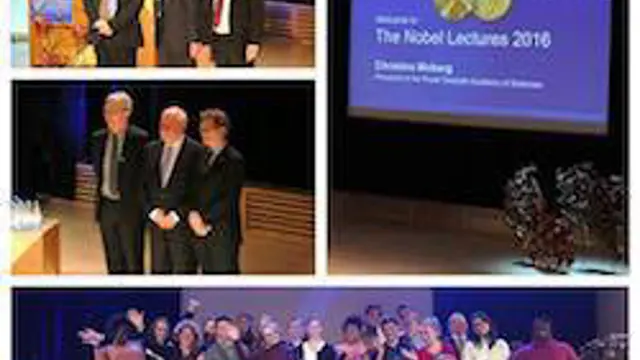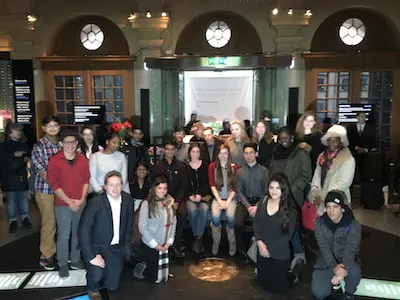A Nobel Tradition: NSHSS Members Visit Nobel Week 2016

Now an annual tradition, each December NSHSS takes a group of members to participate in a special study trip to experience Nobel Week in Stockholm, Sweden. This year, 26 students had the unique opportunity to witness first-hand the legacy of NSHSS Co-founder and Chairman Claes Nobel’s family. This exclusive member-only event for NSHSS high school and college scholars ran from December 6th through the 10th in partnership with Stockholm University.
NSHSS members attended several activities during the annual Nobel Week in Stockholm, a time in which the 2016 Nobel Prize Ceremonies and numerous other festivities occur, including visits to the Nobel Museum; a tour of Stockholm City Hall; and attendance at the lectures for the Nobel Prizes in physics, chemistry and economic sciences.
At a special reception, NSHSS scholars discussed the intricacies of the Prizes with the president of The Royal Swedish Academy of Sciences and members of the selection committees for the Nobel Prizes in physics, chemistry and literature.
Yash Maheshwari: Traveling for Science
Yash Maheshari is originally from Rajasthan, in West India, but was brought up in Guwahati, Assam, on the opposite side of the country. He is currently a first-year student in Mechanical Engineering at the National University of Singapore, and expects to graduate in 2020.
Why did you attend Nobel Week 2016?
I wanted to attend the Nobel Week 2016 primarily because I wanted to explore something new. College is the time when we let ourselves free and try different things. It was a completely new experience for me. I was never too much into the Nobel festivities earlier and so wanted to expose myself to it. And this experience has completely changed my perspective. Also, through this trip, I wanted to cater my interest of travelling. Anyone would hardly think of travelling to a place like Sweden in the freezing month of December. I wanted to take on this challenge.
Which was your favorite lecture? What did you learn?
My favorite lecture was that of Chemistry. Only great minds can think that something called "Molecular Machines" can exist. It is beyond our thinking. So, getting to know how this thing was discovered was really interesting. It was amazing to know how molecules can work to generate mechanical energy as if they are moving pistons of a car engine!
What is your favorite memory from the trip?
I would like to mention about two favorite memories. First was getting to meet Sir Muhammad Yunus, 2006 Nobel Peace Prize recipient, at the Nobel Week Dialogue. It was really inspiring talking to him and standing by his side. Also, I managed to grab a selfie with him. Second was getting to experience live snowfall. Back in India and Singapore, I cannot even dream of seeing snowfall. So, before starting the trip, I hoped to see snowfall and that exactly happened!
How do you think this trip will affect your future career/academic goals?
At every stage of our life, we get to learn something new. This trip has made me more experienced in terms of travelling alone and dealing with people. It has made me more responsible and I feel that these soft skills will definitely be very useful to me in any endeavor which I undertake in my future career.
Sharidan Brown: A Passionate Chemist
Sharidan Brown is a Senior at Gardiner High School in Gardiner, Montana. She is hoping to study biochemistry at one of four schools, the University of Oregon, University of Illinois Urbana-Champaign, Montana State University, or Bucknell University.
Why did you attend Nobel Week 2016?
I primarily wanted to attend Nobel Week in order to broaden my horizons in terms of my understanding of our natural world, and through my educational opportunities. I was very excited to attend the lectures in Chemistry, which is my passion, and also the Nobel Museum which harbors scientific progress through the ages. I also wanted to experience Swedish culture and Stockholm University as I consider it as a location for a study abroad opportunity or a place for my graduate studies.
Which was your favorite lecture? What did you learn?
My favorite lectures this week were by far the Chemistry ones. Jean-Pierre Sauvage, Sir Fraser Stoddart, and Bernard Feringa all gave wonderful talks about their research into molecular machines. I learned the process it takes to make ring and knot structures, but also how to animate them to make them move and do something inside a system.
There are some fascinating implications of the work they have done including antibiotic resistance, chemotherapy, data storage, cellular machinery and more. This was a truly eye opening experience but also something that gave me the optimism and ideas to carry on my own research in the future.
What is your favorite memory from the trip?
My favorite memory is perhaps the luncheon after the physics and chemistry lectures. My mind was still reeling from the brilliant ideas and inspiration I was able to witness. During this lunch though, I was also able to speak with the youngest doctorate recipient in Sweden and other people who shared my interests in chemistry, medicine, and biology. I loved being surrounded by people who were passionate about science like me, and in an area where ideas were free to flow.
How do you think this trip will affect your future career/academic goals?
This trip will help shape my future research career in biochemistry, the ideas and the lectures I was able to hear helped cultivate a sense of exploration and optimism in me. My experiences at Stockholm University also have enticed me to study abroad, and experience other cultures during this time. Overall, it was an incredibly eye opening experience and one I will never forget, I will carry these lessons throughout my life.
Emilie la Cour: A Global Perspective
Emilie la Cour is a first year undergrad at the London School of Economics and Political Science (LSE) Originally from Denmark, she is studying International Relations at LSE, and will graduate in 2019.
Why did you attend Nobel Week 2016?
While IR is very politics related, I have also chosen a sustainable development module as part of my degree, and this is what led me to want to attend Nobel Week. The main interest I had in the awesome program NSHSS put together was the Nobel Week Dialogue, because the Future of Food is such a relevant and interesting topic to me.
How do you think this trip will affect your future career/academic goals?
This trip renewed my motivation and inspiration, in regards to my current academic work as well as my extra-curricular activities and also my personal choices. I was reminded, by the impressive laureates we heard speak, how important it is to work hard and be passionate about what you are working on. I think the most impactful words I heard this week were from Muhammed Yunus, who said, “Make a list of the impossible, and then start working to make it possible."
How has the NSHSS played a role in your academic career?
I came away from this trip with a great group of new friends and a better idea of how to focus my efforts in my degree. I learned more about the world’s problems and which niches need more work, and intend to focus on those areas.